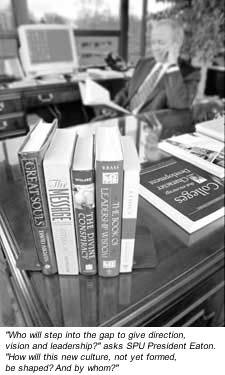By Philip Eaton, President
 At a Point of Profound Cultural Transition, SPU is Called to Leadership
At a Point of Profound Cultural Transition, SPU is Called to Leadership For several years now we
have intensely focused
our energies on reshaping Seattle Pacific
University. We live in a
time of extraordinary change when all institutions are either reshaping themselves or gasping for life in the backwaters of irrelevancy. We will not go there. We have sought to find the compelling vision that must draw us into the future. Such an effort requires clarity of focus, a strong set of core values, a certain direction and, of course, a plan of action.
For several years now we
have intensely focused
our energies on reshaping Seattle Pacific
University. We live in a
time of extraordinary change when all institutions are either reshaping themselves or gasping for life in the backwaters of irrelevancy. We will not go there. We have sought to find the compelling vision that must draw us into the future. Such an effort requires clarity of focus, a strong set of core values, a certain direction and, of course, a plan of action.
"Engaging the Culture/Changing the World" -- that's what we call our vision, and we believe we are on the right track. And the vision unfolds. In the months ahead we will be sharing a dazzling array of accomplishments from all across the spectrum of our vision.
But while I will be the first to celebrate the accomplishments of our good people, I want to make sure we keep the vision out in front of us. I will always be asking the question: "Why do we do what we do at Seattle Pacific?"
I am tremendously fascinated and at times alarmed by what is happening in our culture today. Thomas Oden has recently written that we live in a time of remarkable cultural transition. One culture is dying and another struggles to be born, and we live in the huge gap in between. For two hundred years the world view we call modernism -- characterized by radical individualism, reductive empiricism, moral relativism, narcissistic hedonism and the marginalizing of faith -- has defined the way we look at things. Now it is unraveling, sometimes with devastating, frightening consequences.
And what will take its place? Oden suggests that what we call postmodernism is really only a severe critique of modernism. No new culture has yet emerged to tell the story of who we are and where we think we are going. Cultural drift can be a dangerous thing.
The big question, perhaps the most important question, emerges: Who will step into the gap to give direction, vision and leadership? How will this new culture, not yet formed, be shaped? And by whom?
In this time of transition, we need leaders. But I grow more convinced all the time that we need a new kind of leader. We live in a time when leaders need to understand not just the tools of technology, not just the leverage that money can bring, not just the means of being most productive, but how to shape lives of meaning. We need leaders who can bring hope. We need leaders who can bring moral vision. We need leaders who can bring us together.
"We live at a time of cultural crisis," says the New Testament scholar N.T. Wright. "At the moment I don't hear anyone out there pointing a way forward out of the postmodern morass...." I agree. Where are we going to find direction? Who will be the leaders that will step forward to bring hope and meaning and healing to our communities, our organizations and our world?
Well, here is the answer. In Wright's words again, "The gospel of Jesus points us and indeed urges us to be at the leading edge of the whole culture, articulating in story and music and art and philosophy and education and poetry and politics and theology and even, heaven help us, biblical studies, a world view that will mount the historically rooted Christian challenge to both modernity and postmodernity, leading the way into the postmodern world with joy and humor and gentleness and good judgment and true wisdom." This says it all for me. This is precisely what we are trying to do at Seattle Pacific. This is our vision.
And then Wright concludes with this challenge: "I believe we face the question: If not now, then when? And if we are grasped by this vision, we may also hear the question: If not us, then who? And if the gospel of Jesus is not the key to this task, then what is?"
These questions define precisely for Seattle Pacific the extraordinary opportunity and the profound challenges we accept for our future. We intend to be right at that "leading edge of the whole culture" bringing vision, hope and the healing of the gospel of Jesus. We are lifting up our vision for such a time as this.
![]()

| Please read our
disclaimer.
Send any questions, comments or correspondence about Response to
jgilnett@spu.edu or call 206-281-2051. Copyright © 2000 University Communications, Seattle Pacific University.
Seattle Pacific University |